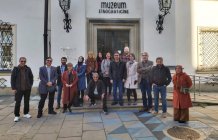articles

Conference attendees
University of Exeter conference on Kurdish Folklore as World Heritage
Kurdish Folklore as World Heritage: Language, Music, and the Archives was the first international conference on Kurdish folklore and archives bringing together academics, folklorists, and archivists with expertise on Kurdish dialects of Kurmanji, Sorani, Zazaki, Hawrami, and Kalhori.
It was jointly organised by University of Exeter and Jagiellonian University in the scopes of the Digital Archives of the Middle East (DAME) project (Exeter) and the research project Citizens of the World: Modern Kurdish Literature and Heritagisation as A means for Transforming and Revitalising The Kurdish Language and The Oral Tradition funded by the Polish National Science Centre. The conference was held in partnership with the Kurdish Heritage Institute (Iraqi Kurdistan), Mezopotamya Foundation (Turkey), and the Ethnographic Museum of Krakow.
The oral stories and songs performed by traditional performers dengbêj and çirokbêj have been the source of knowledge, history, as well as the main form of entertainment in Kurdistan up until the 1970s. Kurdish intellectuals, activists and the modern institutions established in the fragile political environments of the ‘Middle East’ have been acutely aware of the necessity of collecting, preserving, and studying the diverse oral traditions of Kurdistan. However, their existence has been threatened by state’ suppressions and lack of funding.
Dr Farangis Ghaderi, Research Fellow at the Institute of Arab and Islamic Studies, said: “Our aim in this conference was to connect the experience of Kurdish folklore collectors and archivists, international researchers and institutions to discuss opportunities and challenges of preserving Kurdish cultural heritage, and also to explore prospects of joint co-operations between archivists and researchers for studying and promoting the diversity of Kurdish cultures.”
Dr Ghaderi added: “we wanted to bring attention to Kurdish folklore for its vital role in language revitalisation and reviving indigenous knowledge production. Attention to the diversity of oral cultures of Kurdistan was very important to us, hence bringing together over 20 experts on all Kurdish dialects, including “endangered” dialect of Hawrami/Gorani, and marginalised language varieties such as Kalhori”.
Dr Joanna Bocheńska, Director of Kurdish Studies at Jagiellonian University said: “I found important that the conference could be planned and organised jointly by a few British-Polish-Kurdish institutions, which offered a possibility to exchange very different perspectives on what a successful research and scientific cooperation may be. The conference promoted Kurdish as the language of research and academic exchange, which I believe is crucial for our understanding of what the decolonising and decentralising of knowledge really is.”
Date: 11 November 2022
